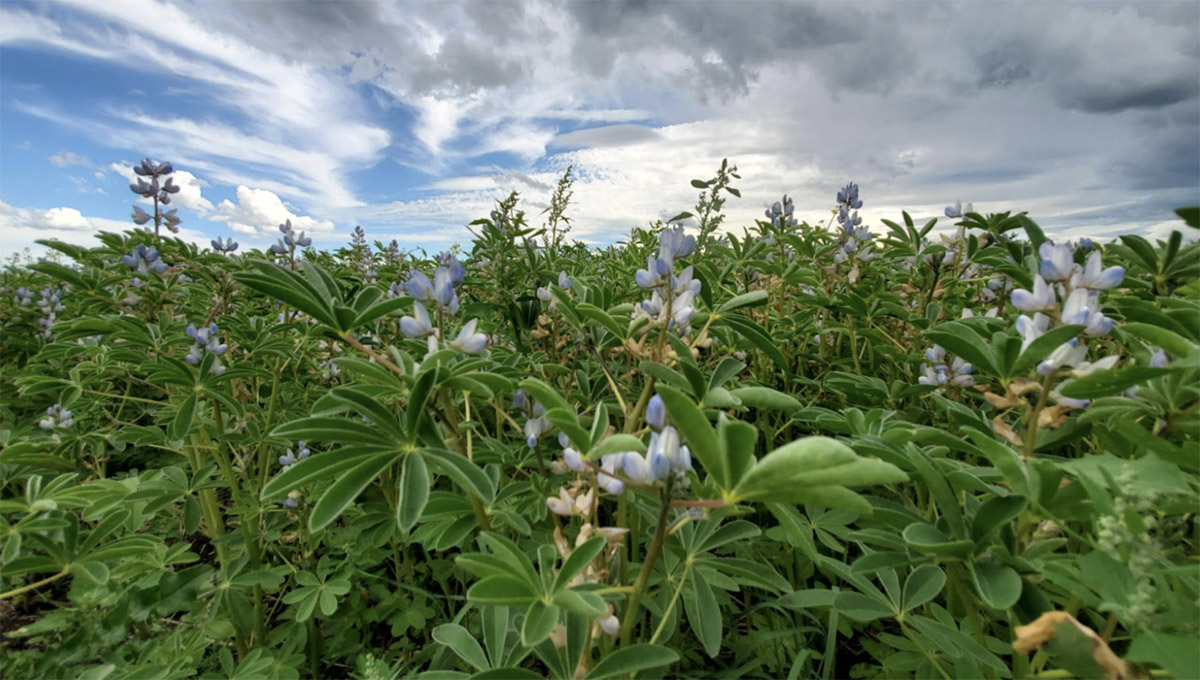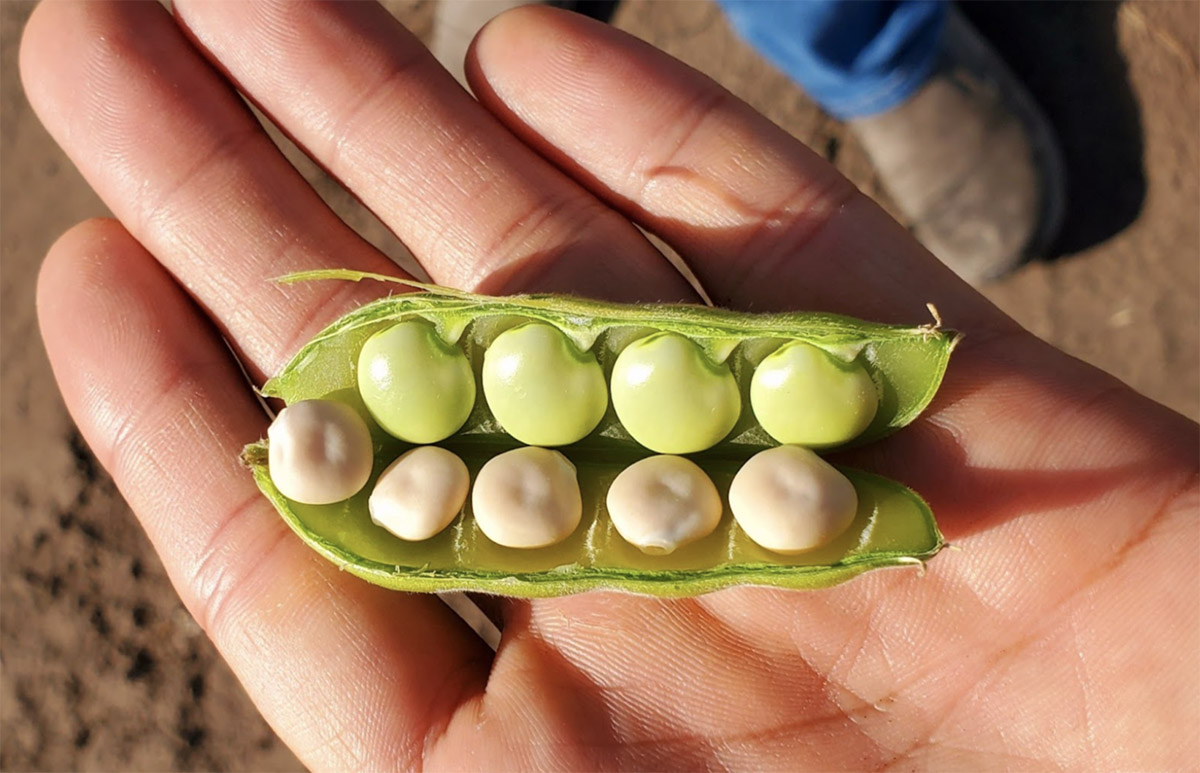February 22, 2022
Lupin Platform Inc. is part of a project funded by Protein Industries Canada working to make the lupin bean Canada’s next staple crop.


Lupin Platform Inc. is an agri-business, based in Calgary, dedicated to establishing a vertically integrated lupin value chain in Canada. In 2021, as part of a project funded by Protein Industries Canada, they formed an alliance with Hensall Co-op, Lumi Foods, and PURIS, working together to make lupin Canada’s next staple crop. With its high protein and low starch content, lupin works well as a substitute in meat-free and vegan alternative products and is already a staple in the animal feed industry. Kirsten Provan spoke to the CEO of Lupin Platform Inc., Tristan Choi, to learn more about the potential of lupins and get his thoughts on the company’s new partnerships.

Lupin as a crop dates back a few thousand years; lupini seeds were actually found in the tombs of Ancient Egyptians. The Greeks then domesticated the beans, introduced them to the Romans and, from there, they became a primary source of protein and nutrition for Roman soldiers. Meanwhile, across the Atlantic, the Pre-Incans of South America domesticated lupins, making them a staple crop of the Incan empire. Today, lupin is found all around the world: the Mediterranean, Australia, South America. Now, for the first time, this ancient tradition has been brought to Canada.
In terms of growing, we’re cultivating sweet lupin rather than lupini beans, which have a high alkaloid content and require heavy treatment to make them fit for human consumption. Sweet lupins, in contrast, have a very low alkaloid level, even compared to other peas and beans, so the process is minimal. Lupin likes moisture and only grows under certain pH conditions, so we have to be quite selective about our locations. It is a late-maturing crop, meaning it needs between one-hundred-and-twenty and one-hundred-and-thirty frost-free days, which makes it somewhat challenging in many parts of Canada. However, it is an incredibly beneficial crop for farmers to grow as it’s naturally resistant to root rot and is nitrogen-fixing, so it helps to rejuvenate the soil.
Production-wise, on the B2B side, we have protein flours, concentrates, and isolates as food ingredients, and lupin meal which is ideal for feed. We’re still experimenting with what we can make from lupin; we’ve tried dairy alternatives, tofu, even coffee. It’s an ongoing process, and something we’re still discovering, but it’s definitely an exciting crop to work with; the possibilities are endless.
Absolutely! Having the opportunity to work with the consortium members has increased awareness of lupin and its potential. It’s always great to get to work with a team of dedicated people rather than just on your own! Our role within the Protein Industries Canada consortium is to oversee the entire project management, creating a lupin ecosystem value chain from seed to fork. This basically means we’re in charge of getting project objectives online, overseeing the progress, managing lupin varietal and weed control research, optimizing the milling and dehulling process, protein extraction and deoiling procedures and food formulations, as well.

We work together in the overall scope of the project but, of course, each company has its own aims and objectives. The ultimate goal of the consortium is to generate more awareness and make it known that lupin is a viable option for the plant protein industry.
The interest has been overwhelming. It’s been wonderful. What’s nice is that the drive hasn’t come from the industrial side but more from the people, the consumers, who are now more self-aware and more conscious about the environment and their dietary choices. With the current climate crisis, people know that the shift to more environmentally-friendly eating habits has to be made and they’re looking for options. The passion from people, particularly younger generations, is really driving this movement.
That’s right. For example, in the plant-based meat alternatives market, our lupin is the ideal choice. It has substantially less flavor and less color than other bean or pulse products, so it requires less masking. If you’re looking to add protein to a product, lupin is a great option.
The plant protein market is dominated by soy and pea; we’re not looking to challenge that. What we’re hoping to do is target niche markets and keto-friendly diets. Lupin has a unique composition: between 30% and 40% protein, 30% dietary fiber and is very low in carbs, starch and oil. This makes it ideal for ketogenic diets and means that less processing is needed. This saves money, time, and energy, so these are the demographics we’re interested in. Lupin is a great option for anyone on a non-GMO or gluten-free diet, as well.
Overall, our objective for the project is to create a vertically-integrated lupin ecosystem in Canada, from seed to fork. We have now secured exclusive seed distribution licenses for the five most suitable varieties for Canada’s climate and we are continuing the new variety testing throughout Canada and parts of the USA. We are also introducing a closed-loop contract farming practice where we want to maintain the unique value proposition of lupin in the marketplace.
Last year was our first year of commercial production; our focus has mainly been on trials and research over the past few years, looking at where to grow and how to grow most successfully. This year, we’re increasing production and we’re looking to produce 40-60,000 metric tons by around 2025, however, if the demand is higher we’ll look to produce more. In order to make lupin a staple crop in Canada, we need to start small and make sure we deliver a quality crop for consumers and farmers so that the trust is there. That’s the most important thing.

Absolutely. We’ve already been getting some interest from Asia and South America. This whole story actually started because Asian countries approached us and asked us if we could grow lupin in Canada. So, yes, the interest is there for Canadian-grown lupin. The inquiries have been overwhelming… in a good way!
Good question. We believe everything comes from the seed and from farmers; it’s farmers who are dedicating their lives to bring us all food. What’s important here is not only profit but providing farmers with solutions for pressing issues, such as the prevalence of root rotting diseases. Our testing indicates that lupin is naturally resistant, so we’re giving farmers the option to use lupin to fight these diseases. It’s also nitrogen-fixing, so it’s great for crop rotation, as well as helping return the soil to its natural state, rather than depending on chemical fertilizers.
We’ve been reaching out to farmers to advocate the benefits, both health-wise and agriculturally. So we already have a handful of brilliant seed growers, with quite a bit of acreage, and we invite the local farmers in the area to come and take a look at what we’re doing; let them see the benefits first-hand. It’s a win–win situation: we teach them about a new, viable crop and in return we get good quality lupin, grown in the ideal areas. We’re taking things slowly but the reception so far has been great.
Yes, we’re currently licensed to grow and distribute five varieties of sweet lupin, and we’re also testing two more varieties from Europe. We’ve had some interest from Australia, wanting us to test their lupin, and also from Ecuador and Argentina.
Our name, Lupin Platform Inc., symbolizes something. Lupin might not become a big commodity crop like pea or soy, it’s too niche, but we realized that there were only a handful of lupin manufacturers worldwide that we could connect with, so we wanted to bring them all together. I probably reached out to every player in the lupin market across the globe, just to let them know what we were doing, how we supported what they were doing, and if there was ever an opportunity to work together, we were all for it. That’s where our name comes from: we want to be the platform for lupin players to thrive and grow together. Our efforts have been successful so far; we’ve made connections in Europe, America, and Australia.
Absolutely. We’re relatively late starters in this field: places like Europe and Australia are already well-established. So, for us, it’s all about connection, creating things together, and experimenting, without stepping on the toes of other manufacturers and still setting up our own individual model, of course. Above all, we just want to get people interested in and learning about the health and environmental benefits of lupin.
Of course. It’s all about what you’re leaving behind for the next generation, what kind of legacy, what kind of messaging. Lupin can be that, in many ways.
I don’t really know! I suppose I was always interested in environmental issues. When I did my Master thesis, my focus was on what kind of policies were needed to enhance the renewable energy sector and this was in Alberta, which is almost the gas and oil capital of the world. And as a Korean-Canadian immigrant, I’ve always been interested in international business and environmental and social responsibility. When I first began working with lupin, I could see it had economic potential but, more than that, I could see it had huge environmental potential, both in terms of fighting climate change and giving farmers more sustainable options. So, you’re right: it’s a very personal thing to me. I look forward to continuing to collaborate with like-minded entrepreneurs and spearheading plant-protein industries in Canada and beyond.
It means a lot. The support from such a great organization as Protein Industries Canada, the National Research Council of Canada and the other consortium members means we have a voice and we have allies. We can spread the word about the benefits of lupin, health-wise and environmentally, and we have the backing we need to make a difference.
Yes, it’s a small team of six people, plus many contractors. We like to keep our business as lean as possible because, for instance, with the COVID-19 situation, you never know what’s going to impact your business negatively. We’ll expand in the future, for sure, but in these early stages, it’s important to keep things close and minimize capital burdens as much as possible.
Yes, absolutely. The season doesn’t wait for you so, if supply chains impact the project management timeline, that throws everything out of whack. You need to seed in April/May, harvest and process at certain times; that kind of stuff is non-negotiable, so if it gets disrupted, that’s a major thing. There have been some challenges, definitely. The droughts last year reduced our overall production goal, but you work with what you have, we’ve just had to get a bit more creative than perhaps we would have. As of now, we’re just looking forward to this year; we think it’ll be a good one.

Tristan Choi / Lupin Platform Inc. / lupin / Canada / Protein Industries Canada / Hensall Co-op / Lumi Foods / flours / concentrates / isolates / lupin meal / dairy alternatives / tofu / coffee / milling / dehulling / protein extraction / plant-based / ketogenic / non-GMO / gluten-free / nitrogen / National Research Council of Canada
Disclaimer: The opinions or views expressed in this publication are those of the authors or quoted persons. They do not purport to reflect the opinions or views of the Global Pulse Confederation or its members.